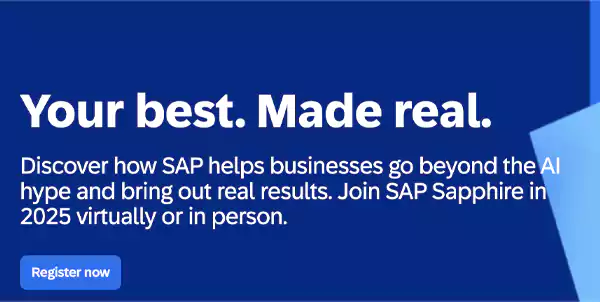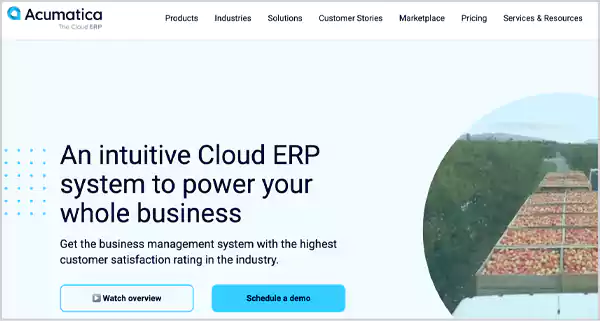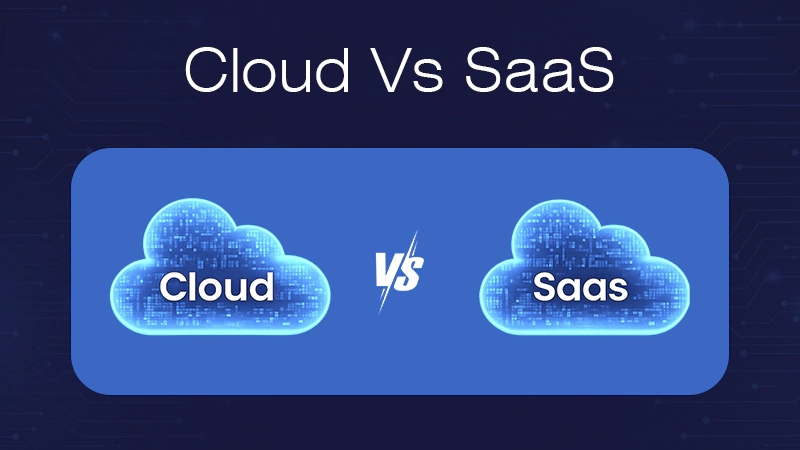Ans: A cloud ERP system is the software that offers financial and operational solutions for the business.
Cloud ERP: Sustainable Solution to Scale Your Business
Cloud ERP: a sustainable solution for businesses to grow. Adapting and evolving with digitalization is the only way for businesses to grow and scale, and that’s where ERP cloud computing helps.
Whether you run a small business or a large enterprise, it gives you the amenities to scale with flexibility and cost efficiency that traditional ERP systems never could match. In this article, we’ll walk you through the working mechanism of cloud-based ERP, its benefits, and how it can empower your business to new heights.
What is Cloud ERP?

Cloud ERP is a type of Enterprise Resource Planning software hosted on a cloud server. Unlike traditional ERPs, which used to require on-premise installation, regular maintenance, and high costs to set up, cloud-based ERPs are cost-efficient and require internet services to run.
These software programs come as a 360-degree solution for businesses. They have the power to handle HR, finance and accounting, supply chain, vendor lists and payments, business analytics, and so much more.
The best part is, these are designed with advanced mechanisms and sustainable practices that help businesses scale faster while keeping the costs low to succeed in this competitive market.
How does Cloud ERP Work?
The number one perk of switching to cloud ERP is that the entire process is hassle-free. You no longer have to wait for the installation of physical servers, complex hardware, and multiple wiring, instead, you can get access to the whole world of ERP just over the internet.
Here’s a little breakdown of how ERP on the cloud works:
- The system is installed on the device.
- All your data is transferred over the cloud network.
- A strong mechanism and codes are set up for you and your team to access.
- The data can be accessed anywhere by anyone at the same time.
- A comprehensive dashboard to manage different aspects of the business with just a few clicks.
Characteristics of Cloud ERP Software
Cloud ERP Systems supports the backbone of any business: finance and operations. However, to utilize the system to its fullest, you must know all the features it offers. Let’s discuss them here:
- Data in Real Time: You can access all the data within seconds just by clicking through the dashboard. The ERP System in the cloud has dedicated sections to navigate through to find the information of any department.
- Updates and Notifications: The system provides payment alerts, security updates, vendor information, and the latest features to keep the business on top of its game.
- Regular Reports: You can get accounting reports and operations charts with cloud ERP solutions. This helps to spot the mistakes and shortcomings and improve them in the future.
- AI and ML Driven: We know how powerful AI is. The ERP system cloud is built with a mechanism driven by AI and ML, having the capability to suggest business advice and predict insights.
These are the features of cloud ERP that you can utilize. Moving ahead, let’s discuss how it is beneficial for your business in the next section.
Benefits of Cloud ERP Systems
Whether you run a digital agency or a manufacturing unit, cloud ERP software can do wonders for your business. Here’s how:
- Scalability: As this EPR system works on the cloud, you can add multiple people to the system as you scale and expand your operations further.
- Cost-Efficient: You do not need to have expensive servers to connect with your team members or the IT team to handle the operations. Cloud ERP can do everything on its own.
- Faster Implementation and Integration: The Cloud ERP software works 10x faster than traditional ones, providing results in seconds. The best part is, it is flexible in a way that you can integrate with any of your existing business software.
- Better Collaboration: The cloud-based ERP solutions ensure that all the data is backed up in the cloud and is accessible to all the team members in real time.
- Remote Set Up: The cloud system lets the employees access and read data from anywhere. This helps the businesses to run even in the tough times of lockdowns.
Now that you’re aware of the benefits of cloud-based ERP Solutions, let’s go ahead and look at some popular names in the domain.
Most Popular Cloud ERP Systems
Since there are a number of cloud ERP software solutions readily available in the market, it is your job to find the right one that fits your needs. To help you out, we have listed the most trusted ones below:
SAP

SAP is a cloud-based ERP system that offers tons of functionalities to businesses. You can utilize this software for HR, Finance, supply chain management, and tracking operations. It is built on a strong security mechanism to safeguard the data.
Oracle NetSuite Cloud ERP

Oracle Enterprise Resource Planning Cloud is used by small-scale and large enterprises alike. It gives a subscription-based model, which you can expand depending on your needs and scalability. This powerful suite helps you stay connected with your clients and team members in real time.
Infor CloudSuite

This one is a popular choice for businesses in distribution, service, and healthcare. It gives all the tools you need to track the business performance and how the supply chain management is hindering the growth.
Microsoft Dynamics 365

Microsoft has gained users’ trust and market reputation for the solutions it has provided to businesses. Dynamics 365 is a more advanced suite that covers all aspects of business management through a single dashboard.
Acumatica

Acumatica is a software firm that creates cloud and browser-based solutions for enterprises. The software applications are easily accessible and can be effortlessly incorporated into any existing system.
These are the reliable ERP systems in the cloud that you can try out for your business. Check out its features, pricing plans, and compatibility on the official websites to understand the system better.
Tips for Choosing the Right Cloud ERP
Selecting the right Cloud ERP software is crucial to building a business strategy. This helps to boost your operations, efficiency, and growth. But how can you know which one is the right fit? We have written the tips to help you out here:
- Business Size: It’s not a one-size-fits-all solution. If you have a small-scale business, your needs would be different from those of already established enterprises. So look at the features and pay off the plan wisely.
- Integration Abilities: Choose a suite that has the capabilities to integrate with every business software you are currently using for the functioning. This helps to make a smooth transition without hindering the process.
- Scalability: Do not buy a cloud ERP that has limited functionalities and no room to expand. Always select the ones with a subscription model that will grow, as will your business.
- Security and Compliance: Switching to cloud-based ERP means all your sensitive data will be up on the cloud network. Thus, you need to install an ERP that has a robust mechanism and strong security to shield the information.
By keeping these pointers in mind, you will be able to find the one that fits your needs. Also, getting real feedback from another business owner is a great way to begin your journey with cloud ERP.
Wrapping Up!
Cloud ERP solutions are truly the game-changer for businesses seeking expansion without spending much. This ERP system works over the cloud network, safeguarding all the data and providing access in real time.
We have explained what cloud ERP is, its benefits, features, and the best ones in this blog. We hope this information will help you find the right fit for ERP and the Cloud for your business. Share the blog with your friends and family, too!
Frequently Asked Questions
Q: What is the Cloud ERP System?
Q: What is Oracle Cloud ERP?
Ans: Oracle Enterprise Resource Planning Cloud is a comprehensive suite that provides applications for accounting, planning, auditing, managing projects, and more.
Q: Is SAP a Cloud-Based ERP?
Ans: Yes, SAP is a popular cloud-based ERP system called SAP S/4HANA Cloud, supporting businesses to strengthen their core of financials and operations.
Q: What is the difference between Cloud ERP and Saas ERP?
Ans: Cloud ERP is the system that works completely over the cloud network, and SaaS ERP refers to the type of cloud system that is used on the basis of subscription.
Q: What is the difference between cloud ERP and Traditional ERP?
Ans: Cloud ERP is hosted on the cloud network, which can be accessed by multiple people using the internet in real time. Traditional ERP, on the other hand, requires installation, hardware setups, regular maintenance, and IT support.
Sources




